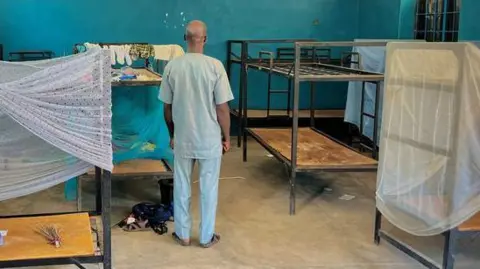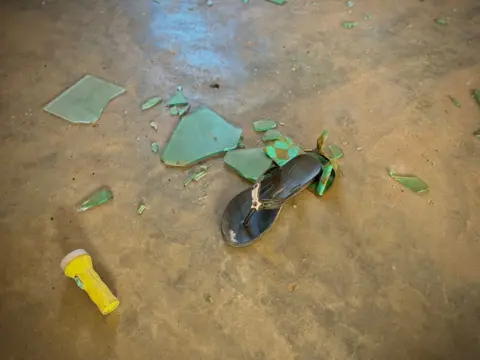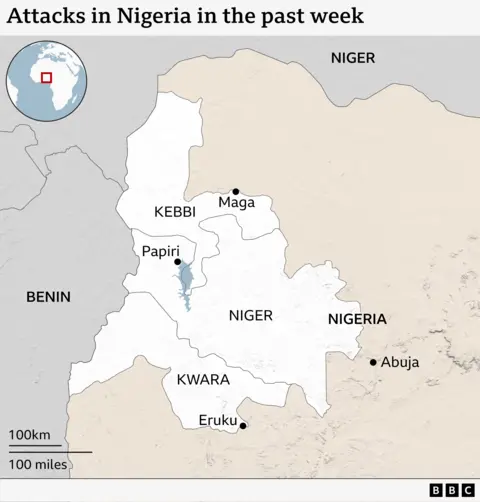Russian mercenaries accused of cold-blooded killings in Mali - BBC speaks to eyewitnesses
A shopkeeper has told the BBC how Russian mercenaries fighting jihadists in Mali carried out the cold-blooded murder of two men in front of him and then threatened to chop off his fingers and kill him too.
This is one of several similar testimonies collected by the BBC showing the tactics used by the Russian fighters as they waged a brutal counter-insurgency operation against Islamist militants in the West African nation - methods widely condemned by human rights groups.
A military junta seized power in Mali in 2021, forcing French troops to leave after accusing them of failing to stem the insurgency. The junta pivoted towards Russia, enlisting the help of the Wagner mercenary group, which was at the time linked to the Kremlin.
Wagner has since pulled out of the country, and its operations have been taken over by
Africa Corps, which falls under Russia's defence ministry.
Some of the Wagner mercenaries highlighted their atrocities on an invitation-only Telegram group until it was shut down in the middle of this year,
said a report released by the European Council on Foreign Relations last month.
They "regularly shared photos and videos of murder, rape, torture, cannibalism and desecration of corpses against alleged insurgents and civilians", the report added.
In June, the Africa Report publication said it had
"infiltrated" the Wagner-linked Telegram channel, finding 322 videos and 647 photographs of atrocities, including severed heads and gouged-out eyes, and posts "laced with racism".
The shopkeeper we spoke to has fled Mali and is now living in a refugee camp across the border in Mauritania. We have named him Ahmed, and have changed the names of all the victims quoted in this article for their own safety.
He told the BBC his ordeal started when the Wagner combatants drove up to the big store that he ran in the central town of Nampala in August 2024.
Despite being regular customers, the Wagner fighters wanted to detain his boss, and accused him of colluding with the jihadists who have a strong presence in the region, Ahmed said.
"They took me to the vehicle and pushed me inside and tied my hands," he added.
"A Wagner soldier took a knife and placed it on my finger, and asked me: 'Where is the shop owner?' I told him he is in [the capital] Bamako, but he replied: 'Wrong answer'."
Ahmed said the Wagner men, who spoke through an interpreter, then took him to a well-fortified Malian military base, and put him in a hangar.
"I and three Wagner guys were in the hangar. They filled a tank with water and asked me to take off my clothes. I did. They dipped my head in the water until I was almost suffocating and I fell. Then they put their feet on my chest and I started to breathe [heavily].
"Then they dipped my head in the water again and asked me for the second time about the shop owner and I told them he is in Bamako," Ahmed said, adding that the torture was repeated for a third time, and he gave the same answer.
After this ordeal, Ahmed said he was thrown into a small toilet block, where there were other local people he knew - including Hussein, who had been so badly beaten that he could not recognise him at first.
"About 40 minutes later, they brought Umar [another acquaintance]. He too was in a terrible situation. They had tortured him. We slept in that toilet and the next morning they brought a piece of bread and a small cup of coffee," Ahmed said.
He said he was taken back to the hangar, where the Russian fighters wrapped a bandage around his face and head.
"I couldn't see. I couldn't talk. I couldn't hear. They put a knife on my throat and told the interpreter to tell me that this is the last chance. If I didn't tell them the truth, they would behead me. I told the interpreter I had given them all the information I had."
Ahmed said his Russian interrogators then removed the bandage and threw him into a kitchen where he spent the night with two strangers - an ethnic Tuareg man who told him he had been detained without being told why while grazing cattle, and an Arab man who said he was picked up while looking for his camels.
The nomadic Tuareg and Arab communities who roam the vast deserts of northern Mali are often treated with suspicion, especially since a Tuareg separatist uprising more than a decade ago was hijacked by jihadist groups, who now operate mainly under the banner of an al-Qaeda affiliate, Jama'at Nusrat al-Islam wal-Muslimin (JNIM).
After spending the night with them, Ahmed said he was taken back to the hangar.
"They brought the two men [the Tuareg and Arab] and beheaded them in my presence," Ahmed said.
Looking terrified, Ahmed tried to beat back tears as he told the BBC what happened next.
"They brought one of the bodies closer to me to smell the fresh blood, and said: 'If you don't tell us the whereabouts of the shop owner, you will suffer a similar fate.'"
Ahmed said his life was only spared after a Wagner commander made a call to a Malian army officer, who assured him that the shop owner was not colluding with the jihadists.
Ahmed said the commander then went to the base to release him, as well as another shop owner and Umar.
"I spent 15 days there. Then I decided to leave for Mauritania with my wife and children," Ahmed said.
The BBC has approached Russia's and Mali's defence ministries for comment, but they have not yet responded.
The Sentry, a campaign group co-founded by actor George Clooney and former US government official John Prendergast, said
in a report released in August that Wagner fighters had not only carried out abuses against civilians, but it had also created "chaos and fear" within the Malian military hierarchy, forcing commanders to remain silent.
It quoted a Malian official as saying that Wagner operatives were "worse than the French. They think my men are more stupid than them. We have gone from the frying pan to the fire."
Declaring its mission "accomplished" despite the worsening security situation,
Wagner announced its withdrawal from Mali in June this year, with analysts saying that most of its fighters had been absorbed into Africa Corps.
The Senegal-based Timbuktu Institute think-tank estimates that 70 to 80% of Africa Corps fighters were formerly in Wagner.
"In reality, Africa Corps inherits Wagner's legacy of human rights violations, including extrajudicial killings and acts of torture,"
it said in a report released in July.
However, violence-monitoring group Acled said that early trends suggested that the conduct of Africa Corps was "less predatory" than Wagner's.
"The number of incidents involving deliberate civilian killings or mass atrocities has fallen noticeably," Acled's senior West Africa analyst Héni Nsaibia told the BBC.
The conflict has forced nearly 50,000 people to flee to M'berra refugee camp in Mauritania, according to the UN refugee agency.
They include Bintu, who told the BBC she ran away from her village last year with her five children after her husband's bullet-riddled body was dumped in a river. Local people told her that he had been repeatedly shot while riding his horse.
"Who is going to look after my children? Who is going to look after me?" she asked as she swept the small plot of land outside her home at the camp.
"When I hear the name Wagner, I feel traumatised. I feel afraid. I hate the word Wagner because they have brought sadness to me."
Wearing a navy blue outfit and white turban, another refugee, Youssouf, was sitting under a shed, his eyes reflecting the trauma of his experiences, when the BBC met him.
He recalled that he and his friends had been herding cattle near the Mauritanian border, and had stopped by a well to get fresh water when they saw a cloud of dust in the distance.
Youssouf said a vehicle raced towards them, and it turned out to be Wagner fighters, who started beating them for no apparent reason - an experience several refugees recounted to the BBC.
Youssouf recalled that one Wagner fighter "grabbed me and threatened to throw me into the well", but another intervened to prevent him from doing so.
He said he and his friends were then bundled into different vehicles, each carrying three Wagner operatives.
"While they drove, they beat me the entire way, kicking me, pressing their boots into my face and head, and hitting me in the chest. I don't know what happened to our cattle."
Along with his friends, he was taken to a military camp north of the town of Léré, where he says they were tortured.
"A man came with a metal rod. He beat us so badly I felt like I was going to die. They tied our arms apart so we couldn't move, hitting us hard on our thighs and legs to stop us from escaping."
Youssouf said they were then dragged into an office, with the beatings continuing until they fainted.
He added that when he regained consciousness, he found his hands tied to the motionless hands of one of his friends.
"They then brought a motorbike close to my face, revved the engine, and blew exhaust into my nose to wake me up fully. They did the same to my friend, but he didn't respond. That's when they realised he was dead."
Youssouf said he did not know what happened to his friend's body, but he and his other friends were released - again, with no explanation.
Ahmed, the former shopkeeper, said that before his own torturous experience, he saw how Wagner was committing atrocities on a mass scale, once placing the entire town of Nampala and surrounding villages under siege.
He said he was among residents who were forced to gather on a football field, with the mercenaries trying to identify the person whom, they alleged, was using a satellite phone.
"They called Sikou Cissey. He was just a random man wearing a traditional hat. They took off his clothes and filled a barrel with water and held him by the legs. They then dipped his head in the barrel until he was unable to breathe," Ahmed said.
With Malian soldiers looking on, the Wagner fighters later brought shovels and pickaxes to the football field to scare people into thinking they were going to dig their own graves unless they pin-pointed the person whom they alleged was using the satellite phone, Ahmed added.
He said that after being in the scorching sun the whole day, the residents were released - except for one who was taken away by the mercenaries and whose fate he does not know.
Ahmed said he wanted the Wagner fighters to be brought to justice, and to be held accountable for their atrocities.
"The experience haunts me. It gives me nightmares," he said as he sat in his all-black outfit at the camp, unsure whether he would ever return to his ordinary life as a shopkeeper.
https://www.bbc.com/news/articles/crmx7x3yjyko



